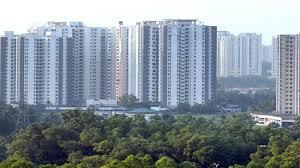


Mumbai, the financial and commercial capital of India, is experiencing an unprecedented boom in its real estate sector. As we navigate through 2024, the city is on track to surpass a remarkable ₹1.34 lakh crore in housing sales. The momentum is set to continue, with projections indicating that Mumbai’s residential sales value could touch the ₹2 lakh crore mark by 2030. This blog delves into the key factors driving this surge and what the future holds for Mumbai’s real estate landscape.
According to a recent JLL report launched at NAREDCO’s flagship event, The Real Estate Forum (TREF) 2024, Mumbai has achieved record-breaking sales figures. Residential sales in 2023 breached ₹1 lakh crore, and the market is expected to exceed ₹1.35 lakh crore in 2024. This impressive growth is driven by a combination of high demand, strategic infrastructure developments, and enhanced connectivity.
In the first half of 2024 alone, Mumbai's residential market recorded its highest-ever sales over a six-month period, achieving around 57% of the total sales recorded in 2023. The city’s contribution to India’s residential market has grown significantly, accounting for approximately 25% of new project launches and 22% of total sales from 2022 to H1 2024.
Mumbai's real estate boom can be largely attributed to its ongoing and planned infrastructure projects. Key initiatives include:
Mumbai Trans Harbour Link (MTHL)
Navi Mumbai Suburban Rail
Various Metro Lines
These projects are enhancing connectivity between Mumbai city, its suburbs, Thane, and Navi Mumbai. Improved accessibility has spurred residential launches and sales, particularly in areas like Navi Mumbai, Thane, and Western Suburbs II. The anticipated completion of these projects is expected to reduce average travel time within the city by 50% and alleviate pressure on existing public transportation systems.
The JLL report highlights that Mumbai's residential market is poised for sustained growth. As of June 2024, Mumbai stands out as a leading contributor to national residential launches and sales. Developers have acquired approximately 260 acres of land for residential development since 2022, indicating strong future potential. This acquisition represents a development potential of 42-48 million sq. ft, with an estimated sales potential exceeding ₹70,000 crore.
Mumbai’s real estate development has evolved from the southern parts of the city to the northern and eastern suburbs. This shift is driven by increased demand for housing, better connectivity, and the availability of land. Areas such as Navi Mumbai and Thane have become popular residential destinations, benefiting from infrastructure improvements and enhanced connectivity.
Redevelopment remains a crucial strategy in core city areas, while new infrastructure developments like the Coastal Road and Metro expansions are opening up opportunities across both the Island City and its suburbs.

Conclusion
Mumbai’s real estate market is witnessing a transformative phase, driven by robust infrastructure development and a dynamic shift in residential preferences. With the city's residential sales expected to surpass ₹1.35 lakh crore in 2024 and potentially exceed ₹2 lakh crore by 2030, the future looks promising for investors, developers, and homebuyers alike.
As infrastructure projects continue to unfold and new residential hubs emerge, Mumbai's real estate market is set to achieve new milestones, solidifying its position as a leading residential market in India.
News Articles
Other Real Estate News Articles